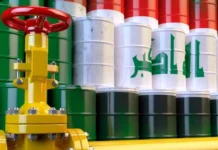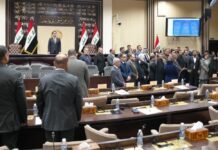Tishwash: Oil deals”… Iraqi steps to get out of America’s influence towards Russia and China
The British “Oil Price” website stated that Iraq is increasingly moving away from the influence of the United States, through energy deals with Moscow and Beijing, pointing to Iraq’s recent decision to increase its oil production, and to supply this additional increase to China, and that the summit between the President Minister Muhammad Shiaa Al-Sudani and Russian President Vladimir Putin discussed the issue of resuming the export of the region’s oil.
Shafaq News Agency translated the report of the British website specialized in energy news, which indicated that in light of the current primary focus of the United States in the Middle East on trying to prevent the expansion of the war between Israel and Hamas, China and Russia are busy strengthening their influence in other locations in the region, including Recently in Iraq.
The report considered that enhancing this influence is still a major goal for Beijing and Moscow by expanding their Iraqi presence for three main reasons, the first of which is that Iraq can easily become the largest producer of crude oil at the global level within a relatively short period of time if the rampant corruption in the oil sector is reduced. And gas.
The second reason, according to the report, is Iraq’s geographical location in the heart of the Middle East, making it a vital link in establishing a network of logistical communications from Eastern Eurasia to Western Europe.
Regarding the third reason, the report stated that Iraq, along with Iran, under whose permanent influence it operates, constitutes the spiritual, political, military and cultural core of the Shiite Crescent, adding that there was a wave of activity during the past two weeks that included Iraq, Russia and China, confirming the seriousness of continuing all these plans.
The report explained that plans to increase Iraq’s oil production and then send this additional production to China witnessed an acceleration, especially during the Council of Ministers meeting last week headed by Muhammad Shiaa Al-Sudani.
The report quoted a high-level source working closely with the Iraqi Oil Ministry as saying that the Iraqi Council of Ministers agreed to increase crude oil exports to China by 50%, raising it from 100,000 barrels per day to 150,000 barrels per day, adding that it was also agreed to enhance The daily production capacity of the largest oil fields in Rumaila, whose partners include BP (47.6%), the China National Petroleum Corporation (46.4%), and the State Oil Marketing Corporation (6%), increased from 1.3 million barrels per day to 1.4 million barrels per day by the end of the year. Present.
The report pointed out that these steps represent part of Iraq’s plan to increase its oil production to reach 8 million barrels per day by the year 2028, adding that there is no main reason for not achieving such an increase and even reaching up to 12 million barrels per day, which is a possible production given Iraq’s resources. Oil, but the only obstacle here is the rampant corruption in the oil and gas sector, which has hindered this progress for years.
The report also indicated that at the same meeting of the Iraqi government last week, it was also agreed that Iraq should provide its full support for the implementation of all aspects of the “Framework Agreement between Iraq and China” signed in December 2021, adding that this agreement is very similar to In terms of its scope and size, with the “Comprehensive Cooperation Agreement between Iran and China for 25 years.”
The report continued that the main part of both agreements is that China has the right of first refusal on all oil, gas and petrochemical projects that will be proposed in Iraq for the duration of the deal, and that it is granted at least 30% of all oil, gas and petrochemical projects that it purchases.
The report added that the other main part of the framework agreement between Iraq and China allows Beijing to build factories throughout the country, with the consequent creation of infrastructure related to projects that also serves the “Belt and Road Initiative”, including railway lines under the supervision of its corporate employees. Chinese present on the ground in Iraq.
The report explained that the railway infrastructure in Iraq will be completed after the completion of the network in Iran, which began in earnest in late 2020 with an electricity contract related to the 900-kilometre main railway linking Tehran to the northeastern city of Mashhad. He added that plans have been drawn up to establish a high-speed train line between Tehran, Qom and Isfahan and to expand this developed network to the northwest via Tabriz, which is considered the headquarters of many major sites related to oil, gas and petrochemicals, and the starting point for the Tabriz-Ankara gas pipeline – which will be a focal point for the Silk Road. The new 2,300-kilometre-long project connects Urumqi (the capital of China’s western Xinjiang province) to Tehran, and will connect Kazakhstan, Kyrgyzstan, Uzbekistan and Turkmenistan, before reaching Europe via Turkey.
The report quoted an Iraqi source as saying that, given the size and scope of the infrastructure that will be developed, there will be a heavy presence of Chinese “security” personnel in major projects throughout Iraq, adding that these elements will also be supported by security personnel associated with the participating Iranian companies. It is also in Chinese-Iraqi projects, especially those affiliated with the giant Khatam al-Anbiya Company, which is controlled by the Iranian Revolutionary Guard.
The report considered that the extensive presence of Iranian companies that maintain a large number of Revolutionary Guard forces inside Iraq, such as Khatam al-Anbiya, would allow Iran to continue its long-term plan to establish a strategic “land bridge” to the Mediterranean coast in Syria.
He continued that other employees of the state-owned Russian company “Rosoboro Nexport”, which monopolizes all dual-use military products, services and technologies, appear at all major infrastructure development sites in Iraq.
The report concluded by indicating the existence of long-term plans by Russia (along with China) to control a unified Iraq, including the Kurdistan Region. He recalled the meeting held on October 11 between Iraqi Prime Minister Muhammad Shia al-Sudani and Russian President Vladimir Putin in Moscow, where they spoke generally about developing the Iraqi oil sector and the presence of Russian oil companies in it.
But the report considered that the reality, according to what an Iraqi source working closely with the Iraqi Ministry of Oil said, indicates that the discussions also included the future of oil exports from the Kurdistan Region to Turkey, in which the giant Russian oil company, Rosneft, plays a major role, given its control. Effective on a large part of the region’s oil since 2017. He added that after 3 days, a meeting was held between the Minister of Energy and Oil, Hayyan Abdul-Ghani, with the head of the Russian “Gazprom” oil company, Alexander Dyukov, to discuss future oil and gas projects in southern and northern Iraq. link
************
Tishwash: Tomorrow, Baghdad will host a conference for 85 ambassadors and heads of Iraqi political and consular missions abroad.
The seventh edition of the Iraq Ambassadors Conference will begin tomorrow, Saturday, in the capital, Baghdad.
The official spokesman for the Ministry of Foreign Affairs, Ahmed Al-Sahhaf, said in a statement received by Shafaq News Agency, “The conference is titled “Iraqi Diplomacy, Balanced International Relations and Sustainable Economic Development,” for the period 4-8 November 2023, with the participation of (85) Iraqi ambassadors and heads of political and consular missions. Iraqi abroad.
Al-Sahhaf explained, “The conference aims to present a developed agenda for Iraqi diplomacy, which will be reflected in more presence and effectiveness of foreign policy, activating Iraq’s role in Arab, regional and international organizations and strengthening relations with countries on the basis of the principle of mutual respect and achieving common interests. The conference is an in-depth opportunity to exchange views with the aim of Implementing the priorities of the government program and intensifying diplomatic work with various parties.” ink
**************
Tishwash: It takes 5 minutes.. Sudanese advisor: Launching the (Visa Direct) service will contribute to reducing the exchange rate
Today, Friday, Fadi Al-Shammari, Advisor to the Prime Minister, Fadi Al-Shammari, considered the launch of the (Visa Direct) service for transferring money abroad a successful step that will facilitate the work of small merchants, stressing that it will contribute to reducing the exchange rate in the parallel market and its procedures take only 5 minutes.
Al-Shammari added, “The launch of banking work during the era of the current government is taking place with a new vision and modern mechanisms, and First Bank of Iraq is the first bank to launch a direct financial transfer service digitally through the (Visa Direct) service.”
Today, Friday, Fadi Al-Shammari, Advisor to the Prime Minister, Fadi Al-Shammari, considered the launch of the (Visa Direct) service for transferring money abroad a successful step that will facilitate the work of small merchants, stressing that it will contribute to reducing the exchange rate in the parallel market, and the procedures take only 5 minutes.
Al-Shammari told the official agency, followed by (Al-Oula News): “The launch of banking work during the era of the current government is taking place with a new vision and modern mechanisms, and First Bank of Iraq is the first bank to launch a direct financial transfer service digitally through the (Visa Direct) service.”
He added, “This development is a major achievement that is linked in one way or another with the strategic vision held by the government and launched by the Prime Minister in financial, banking and economic management, and is also consistent with the new directions of the Central Bank in the process of re-evaluating, restructuring, organizing and maturing banking work in Iraq, and we are now witnessing the start of “It will have a significant impact on the commercial and banking reality in Iraq.”
He continued, “We hope that citizens will interact with this banking service, which will contribute to cutting off speculators in the black market, and the Visa Direct service will include many small merchants and will help them access a clear, explicit, official, and legal platform to transfer money abroad easily and conveniently, from account to account, at the official exchange rate.”
He pointed out that “this service will contribute to a decrease in the exchange rate in the parallel market within the framework of ongoing government work to regulate banking work.”
Earlier, the Central Bank of Iraq announced the launch of the “Visa Direct” service to facilitate financial transfers, in coordination with the international company “Visa” and cooperation with the First Bank of Iraq.
The bank confirmed that the “Visa Direct” service is for direct financial transfer to the bank’s customers in Iraq, and it was launched digitally for the first time through a special application, and each customer in the First Iraq Bank (FIB) can transfer five million dinars daily, and 13 million dinars monthly, which will be calculated at a price. Official exchange.
Central Bank Governor Ali Al-Alaq said during his speech at the service launch conference: “The Visa Direct tool came at the right time to facilitate transfer operations, especially simple transfers at the citizen level.”
He stated, “This tool facilitates the demand for foreign currencies and we are trying to expand access to these currencies in easy ways,” stressing that “the issue of foreign transfers, selling the dollar, and the exchange rate are fundamentally linked to employing as many electronic tools as possible.” link





